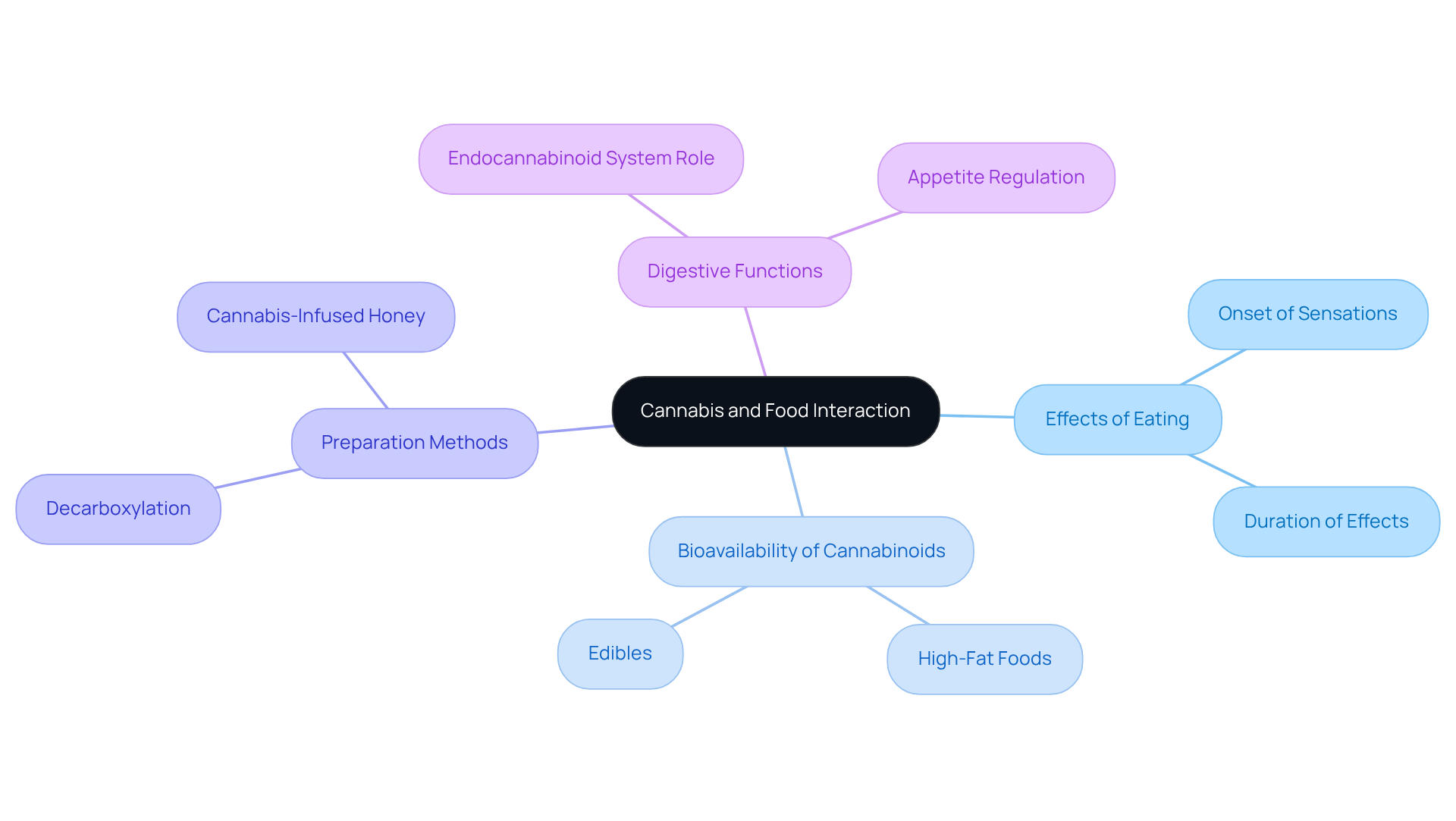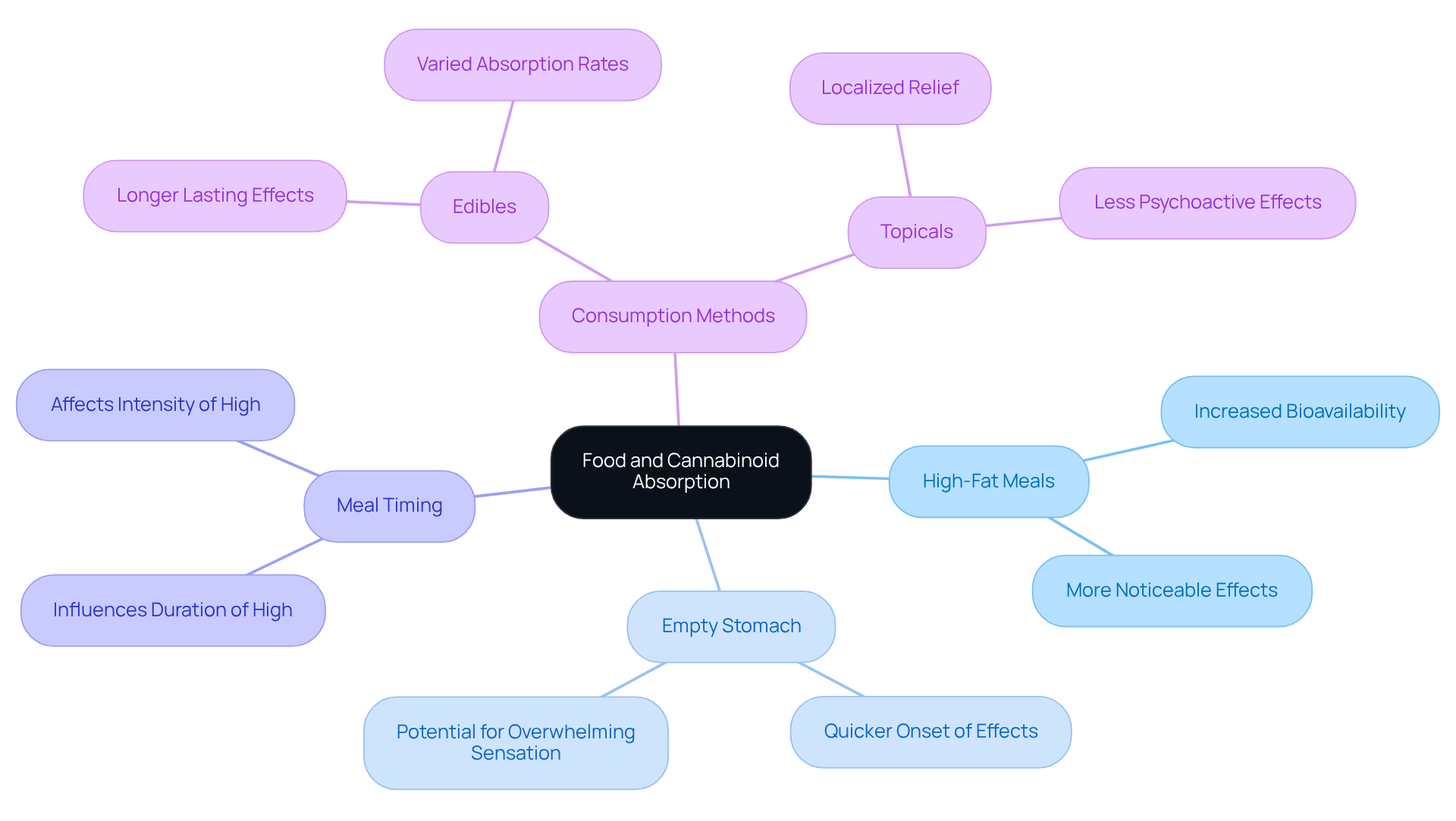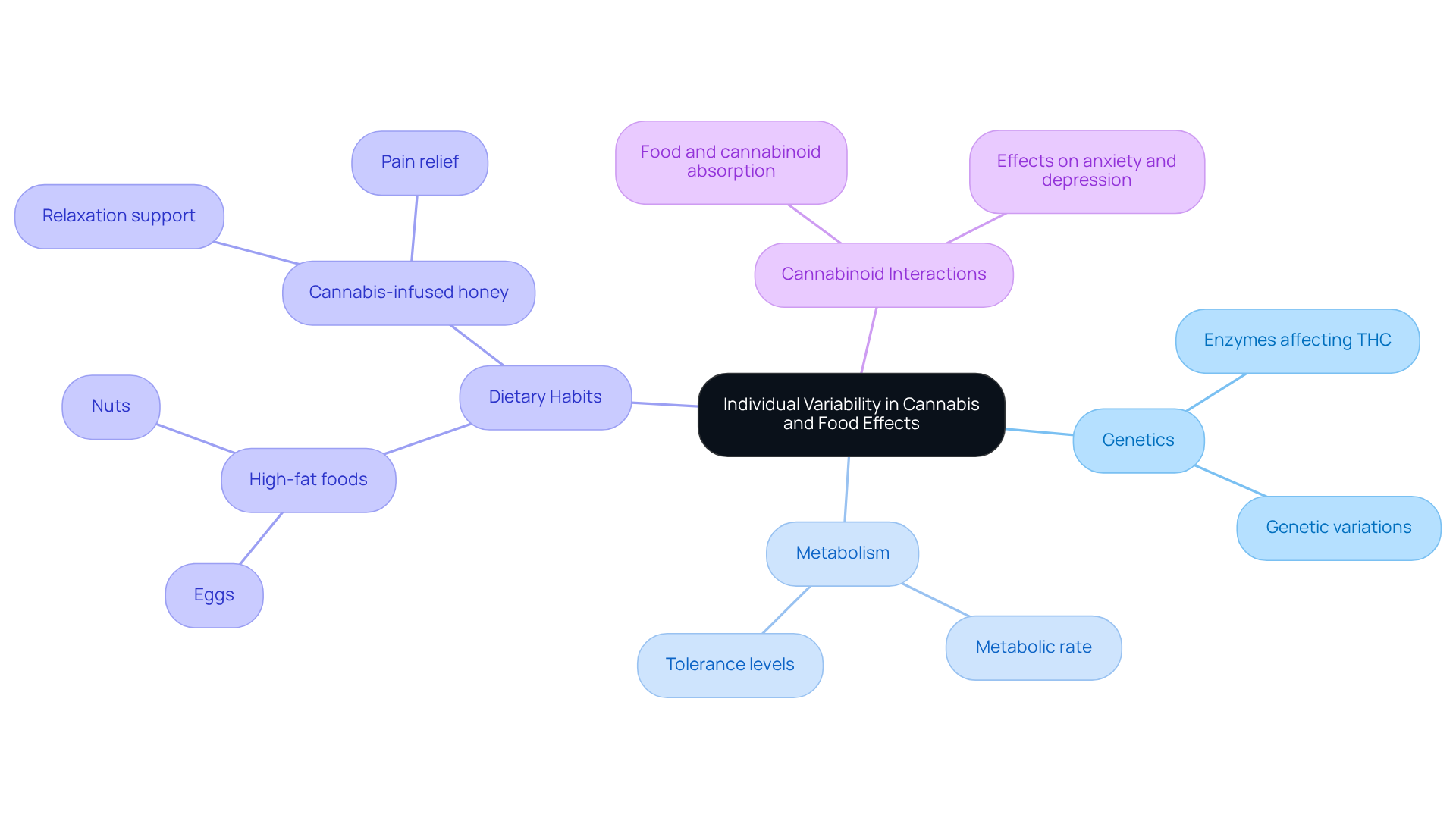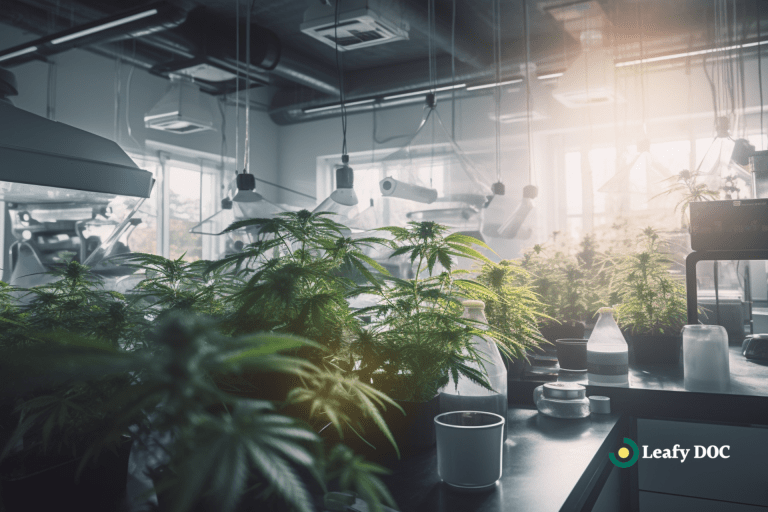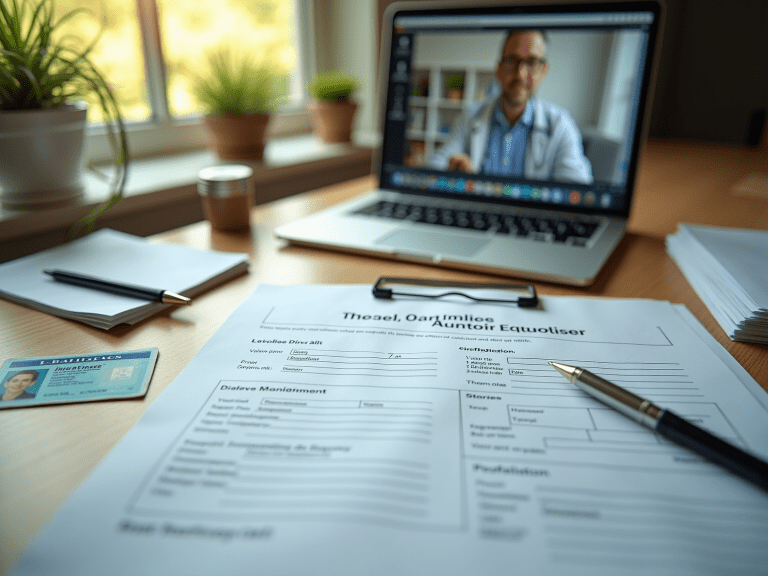Does Eating Make You Less High? Understanding Food’s Impact on Cannabis
by Maya Green · July 6, 2025
Discover how food affects cannabis effects and whether eating makes you less high.
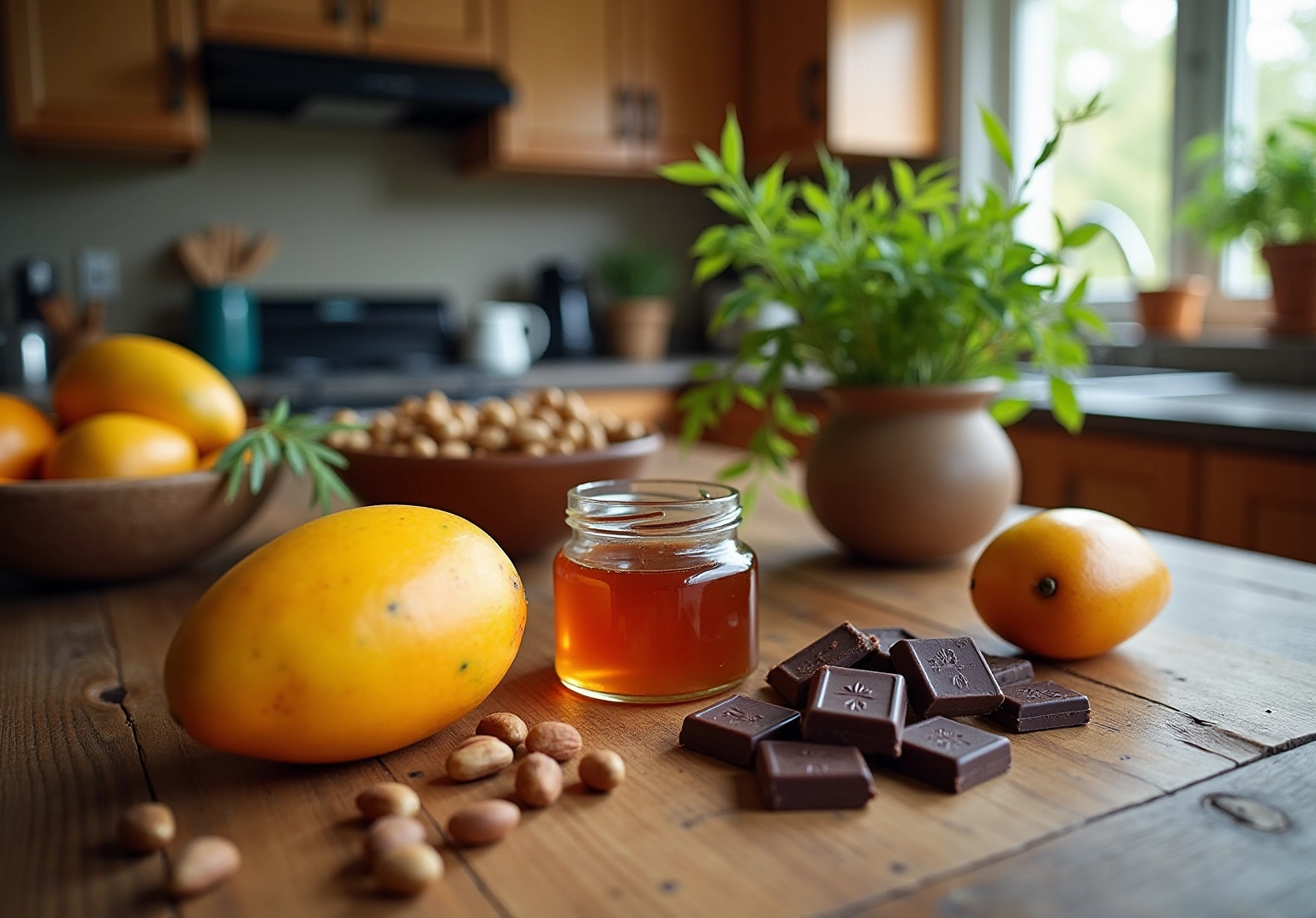
Overview
It’s important to remember that eating doesn’t necessarily make you feel less high. In fact, it can enhance the absorption of cannabinoids, especially when you enjoy high-fat meals. This can lead to more pronounced effects from cannabis, which many people may find surprising.
Research shows that food interacts with cannabinoid bioavailability, meaning that when you’re in a fed state, THC levels in your bloodstream can increase. This can influence not just the intensity but also the duration of your high.
You might be wondering how this works in your own experience. By understanding how your body interacts with food and cannabis, you can make more informed choices that suit your needs. Remember, it’s all about finding what works best for you.
Introduction
The intricate relationship between cannabis and food has sparked curiosity among many users who seek to optimize their experiences. It’s important to understand that dietary choices can significantly influence cannabinoid absorption, potentially enhancing or diminishing the effects of cannabis. You may wonder: does eating make one less high, or can it actually amplify the experience? Delving into this question reveals a complex interplay of factors that can impact how individuals feel when consuming cannabis. These factors include:
- Timing
- Food composition
- Personal metabolism
By exploring this topic, we can better navigate our experiences and make informed choices.
Explore the Basics of Cannabis and Food Interaction
Cannabis comprises various compounds, primarily cannabinoids like THC (tetrahydrocannabinol) and CBD (cannabidiol), which interact with your body’s endocannabinoid system. It’s important to remember that the effects of marijuana can be significantly influenced by whether you have food in your digestive system, leading to the question of whether eating makes you less high. Using marijuana on an empty stomach often leads to a quicker onset of sensations, which raises the question: does eating make you less high by altering how quickly you feel those effects and how long they last? Understanding this can be crucial for optimizing your experience, especially if you are using cannabis for medicinal purposes.
Research shows that certain foods can affect how much eating makes you less high or enhance the effects of cannabis. For instance, foods high in fats can improve the bioavailability of cannabinoids, making them more effective for you. Studies suggest that THC levels in the bloodstream are higher when cannabis is consumed after eating, which leads to the inquiry: does eating make you less high, as it indicates that food can boost cannabinoid absorption. Conversely, edibles, which tend to have lower bioavailability, may take longer to kick in. This delay can lead to unintentional overconsumption if you’re not aware of how long it might take for the effects to manifest.
Additionally, the relationship between cannabinoids and digestion is quite complex. Your endocannabinoid system plays a role in regulating various digestive functions, such as appetite and fullness, which can further influence how cannabis affects you. Understanding these interactions is vital for anyone looking to navigate their marijuana use effectively, particularly for those managing chronic conditions or seeking specific therapeutic outcomes.
To maximize the benefits of cannabis-infused honey, consider preparation methods like decarboxylation, which activates cannabinoids for better absorption. This process involves gently heating the plant flowers to convert THCA and CBDA into their active forms, THC and CBD, respectively. By incorporating cannabis-infused honey into your meals or beverages, you can enhance your culinary experience while enjoying the therapeutic advantages of cannabinoids. However, it’s also important to be mindful of the challenges that come with oral marijuana use, such as delayed effects and varying strengths, which can complicate dosage control. Remember, being informed and cautious can help you make the most of your cannabis experience.
Understand How Food Affects Cannabinoid Absorption
When considering how what you eat affects cannabinoid absorption, one might wonder, does eating make you less high, particularly with high-fat meals? Cannabinoids are lipophilic, meaning they dissolve more effectively in fats, which can enhance their absorption. You might find that consuming a high-fat meal before using marijuana can greatly increase the bioavailability of THC and CBD, leading to more noticeable effects. On the other hand, if you consume marijuana on an empty stomach, you may experience a quicker onset of effects, but this can sometimes result in a more intense sensation that feels overwhelming for some users.
It’s important to remember that the timing and composition of your meals can affect THC absorption, raising the question of whether eating does eating make you less high, which in turn influences both the duration and intensity of your high. Understanding these dynamics can be vital for anyone looking to manage their experience with cannabis effectively. Additionally, exploring various consumption methods, such as edibles and topicals, can provide healthier alternatives to smoking. By thoughtfully planning your meal timing and content, you can optimize the therapeutic benefits of cannabis while minimizing any potential discomfort.
You may also want to consider using marijuana in moderation to avoid negative reactions, such as gastrointestinal discomfort or nausea, especially if the dosage is high. Taking these steps can help you navigate your experience with cannabis more comfortably and effectively.
Implement Strategies for Eating with Cannabis to Manage Effects
To effectively manage the effects of cannabis through dietary choices, consider these nurturing strategies:
- Eat Before Consumption: It’s beneficial to consume a balanced meal rich in healthy fats before using cannabis. This can enhance cannabinoid absorption, leading to a more regulated outcome. Research shows that dietary consumption significantly affects the pharmacokinetics of THC, leading to the inquiry of whether eating does eating make you less high, as a fed state results in greater exposure compared to fasting. It’s important to remember that the peak time for maximum concentration of THC in the bloodstream occurs later when you’ve eaten, raising the question of whether does eating make you less high and how it can influence your overall experience.
- Choose the Right Foods: Incorporate foods known to boost cannabinoid activity, such as mangoes, nuts, and dark chocolate. Mangoes, in particular, are abundant in myrcene, a terpene that can enhance the effects of marijuana. As Tyler McMurray mentions, “When you eat a mango before ingesting marijuana products, the body will have a higher level of myrcene.” Dark chocolate, which contains anandamide—a neurotransmitter that mimics THC—can elevate your experience by stimulating cannabinoid receptors. Understanding the dosage of marijuana-infused honey can also assist in ensuring safe and effective use, especially for those who may be unfamiliar with marijuana.
- Stay Hydrated: Remember to drink plenty of water, as staying hydrated is essential for reducing certain effects of marijuana, like dry mouth and dizziness. Adequate hydration promotes your overall well-being and can help balance the effects of marijuana.
- Mindful Eating: It’s important to pay attention to your hunger cues and avoid binge eating, which can be exacerbated by marijuana. Opting for smaller, healthier snacks can help manage cravings without leading to overindulgence, highlighting the significance of mindful eating in this context.
- Monitor Your Dosage: Start with a low amount of the substance and gradually increase it as needed. This approach allows you to assess how your body responds to both the marijuana and the meals you’ve eaten, ensuring a more personalized interaction. These strategies are especially beneficial for individuals dealing with chronic pain, anxiety, and other qualifying conditions. Remember, you’re not alone on this journey—taking these steps can lead to a more balanced experience.
Recognize Individual Variability in Cannabis and Food Effects
Personal reactions to marijuana can vary greatly, influenced by factors such as genetics, metabolism, and dietary habits. You may find that certain foods enhance your experience with marijuana, while others might leave you feeling anxious or overwhelmed. It’s essential to recognize that body weight, tolerance levels, and even the specific strain of marijuana can influence the question of whether eating does make you less high in terms of how food interacts with cannabinoids.
Incorporating cannabis-infused honey into your diet offers a versatile and nurturing alternative for wellness and culinary use. This infusion combines the healing properties of hemp with the natural nutrients of raw honey, providing a smoke-free way to enjoy cannabinoids. Many users have shared their experiences of cannabis honey supporting relaxation, pain relief, and overall well-being, which can be especially beneficial for those dealing with chronic pain.
Genetic differences also play a crucial role in how cannabinoids are metabolized. Some individuals may have genetic variations that affect the enzymes responsible for processing THC, leading to more intense or prolonged effects. Additionally, dietary choices—like regularly consuming high-fat foods such as eggs and nuts—can enhance cannabinoid absorption, which raises the question: does eating make you less high? The omega-3 fatty acids found in these foods may also help alleviate anxiety and depression, further supporting the therapeutic benefits of cannabis.
Understanding these personal variations is vital for anyone using marijuana, especially for therapeutic purposes. It encourages you to explore mindfully and to track your experiences to find the most effective and enjoyable consumption methods. By considering healthier ways to consume cannabis, such as adding cannabis-infused honey to your meals or beverages, you can optimize your experience and enhance the benefits of your medical marijuana.
Conclusion
Eating plays a pivotal role in shaping your cannabis experience, influencing both the onset and intensity of its effects. It’s important to understand the intricate relationship between food and cannabinoids to optimize the benefits of cannabis, whether for recreational enjoyment or medicinal purposes. You may wonder whether eating makes one less high, and this question is nuanced, involving various factors such as meal composition, timing, and individual metabolic differences.
Key insights from our discussion reveal that consuming high-fat meals can enhance cannabinoid absorption, potentially leading to a more pronounced experience. Conversely, using cannabis on an empty stomach may result in quicker, yet sometimes overwhelming effects. Strategies like mindful eating, staying hydrated, and managing your dosage are crucial for navigating this complex interplay. Additionally, recognizing the variability in your reactions to cannabis and food can empower you to tailor your experiences for better outcomes.
With this knowledge, it becomes clear that an informed approach to combining food and cannabis can significantly enhance your overall experience. Embracing mindful eating practices and experimenting with different food pairings can lead to a more enjoyable and therapeutic journey. By understanding how food impacts cannabinoid absorption and effects, you can take charge of your cannabis use, fostering a deeper connection with both your dietary choices and your wellness goals. Remember, your journey is unique, and being mindful of your choices can make all the difference.
Frequently Asked Questions
What are the primary compounds in cannabis that interact with the body?
The primary compounds in cannabis are cannabinoids, mainly THC (tetrahydrocannabinol) and CBD (cannabidiol), which interact with the body’s endocannabinoid system.
How does eating affect the experience of being high from cannabis?
Eating can influence how quickly and intensely the effects of cannabis are felt. Using marijuana on an empty stomach often leads to a quicker onset of sensations, while consuming cannabis after eating may enhance the effects and lead to higher THC levels in the bloodstream.
Do certain foods improve the effects of cannabis?
Yes, foods high in fats can improve the bioavailability of cannabinoids, making them more effective. This means that consuming cannabis after eating can boost cannabinoid absorption.
What are the implications of consuming edibles in relation to food?
Edibles tend to have lower bioavailability and can take longer to kick in. This delay can lead to unintentional overconsumption if users are not aware of how long it may take for the effects to manifest.
How does the endocannabinoid system influence digestion?
The endocannabinoid system regulates various digestive functions, such as appetite and fullness, which can further influence how cannabis affects an individual.
What preparation method can enhance the benefits of cannabis-infused honey?
Decarboxylation is a preparation method that activates cannabinoids for better absorption. It involves gently heating the plant flowers to convert THCA and CBDA into their active forms, THC and CBD.
What should users be mindful of when consuming cannabis orally?
Users should be aware of the challenges of oral marijuana use, such as delayed effects and varying strengths, which can complicate dosage control. Being informed and cautious can help maximize the cannabis experience.
Last Updated: July 10, 2025
Get Approved for Your Medical Marijuana Card in Minutes!

Get Your Medical Card
Connect with a licensed physician online in minutes

Like This Article?
Share with your friends
Table of Contents
Keep Reading
-
The Relationship Between Marijuana And Memory Loss
Uncover the Surprising Link Between Marijuana and Memory Loss – Is Your Memory at Risk? Click Now to Learn More and Safeguard Your Cognitive Health!
-
Advancing Knowledge: Exploring The Latest Cannabis Research Studies
Unleash the Power of Cannabis: Dive into Revolutionary Research Studies. Stay ahead with the latest findings and join the movement towards a greener future. Click now to unlock the potential!
-
How to Obtain a Free Medical Marijuanas Card in IL: A Step-by-Step Guide
Learn how to secure a free medical marijuana card in Illinois with our comprehensive step-by-step guide.

